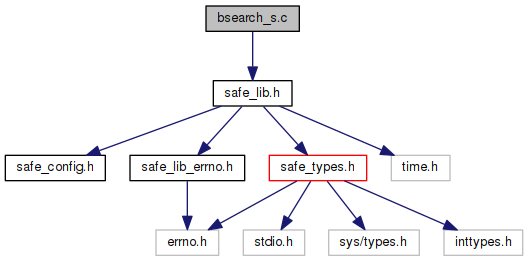#include "safe_lib.h" Include dependency graph for bsearch_s.c:
Include dependency graph for bsearch_s.c:Functions | |
| EXPORT void * | bsearch_s (const void *key, const void *base, rsize_t nmemb, rsize_t size, int(*compar)(const void *k, const void *y, void *context), void *context) |
The bsearch_s function finds an element equal to element pointed to by key in an array pointed to by base. More... | |
Function Documentation
◆ bsearch_s()
| EXPORT void* bsearch_s | ( | const void * | key, |
| const void * | base, | ||
| rsize_t | nmemb, | ||
| rsize_t | size, | ||
| int(*)(const void *k, const void *y, void *context) | compar, | ||
| void * | context | ||
| ) |
The bsearch_s function finds an element equal to element pointed to by key in an array pointed to by base.
The array contains count elements of size bytes and must be partitioned with respect to key, that is, all the elements that compare less than must appear before all the elements that compare equal to, and those must appear before all the elements that compare greater than the key object. A fully sorted array satisfies these requirements. The elements are compared using function pointed to by comp. The behavior is undefined if the array is not already partitioned with respect to *key in ascending order according to the same criterion that compar uses.
- Remarks
- SPECIFIED IN
- C11 standard (ISO/IEC 9899:2011): K.3.6.3.1 The bsearch_s function (p: 608-609) http://en.cppreference.com/w/c/algorithm/bsearch
- Parameters
-
[in] key pointer to the element to search for [in] base pointer to the array to examine [in] nmemb number of elements in the array [in] size size of each element in the array in bytes [in] compar comparison function which returns a negative integer value if the first argument is less than the second, a positive integer value if the first argument is greater than the second and zero if the arguments are equal. key is passed as the first argument, an element from the array as the second. The signature of the comparison function should be equivalent to the following: int cmp(const void *a, const void *b); The function must not modify the objects passed to it and must return consistent results when called for the same objects, regardless of their positions in the array. [in] context additional information (e.g., collating sequence), passed to compar as the third argument
- Precondition
- key, base or compar shall not be a null pointer (unless nmemb is zero).
- nmemb or size shall not be greater than RSIZE_MAX_MEM.
If the array contains several elements that compar would indicate as equal to the element searched for, then it is unspecified which element the function will return as the result.
- Returns
- Pointer to an element in the array that compares equal to *key, or null pointer if such element has not been found, or any run-time constraint violation.
- Note
- Despite the name, neither C nor POSIX standards require this function to be implemented using binary search or make any complexity guarantees. Unlike other bounds-checked functions, bsearch_s does not treat arrays of zero size as a runtime constraint violation and instead indicates element not found (the other function that accepts arrays of zero size is qsort_s).
- Return values
-
NULL when not found or any error
errno values: ESNULLP when key, base or compar are a NULL pointer, and nmemb is > 0 ESLEMAX when nmemb or size > RSIZE_MAX_MEM
- See also
- qsort_s()
